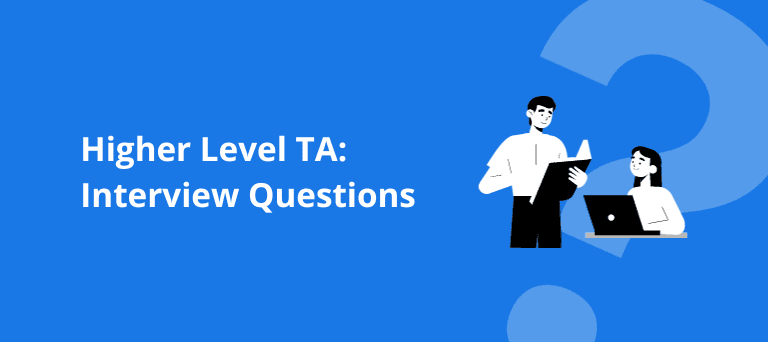Zen Educate Content Team
9 Jan 2024
5
min read

Are you preparing for an interview for a Higher Level Teaching Assistant (HLTA) position? As an aspiring HLTA, it's important to be well-prepared and confident in your abilities. To help you succeed in your interview, we have compiled a comprehensive guide that covers the most common HLTA interview questions. Whether you're a seasoned teaching assistant or just starting your career in education, this resource will provide you with valuable insights and tips to ace your interview.
If you're looking at becoming a Higher Level Teaching Assistant en route to becoming a teacher, read our full guide for going from to HLTA to teacher.
Example questions for an HLTA interview
1. What's your understanding of the role of an HLTA?
In this question, the interviewer aims to assess your understanding of the HLTA role. They may ask you to explain what a Higher Level Teaching Assistant does and how their responsibilities differ from those of a regular teaching assistant.
To answer this question effectively, highlight the additional responsibilities and duties that come with being an HLTA. Discuss your experience in supporting teachers, leading small groups, and managing classroom activities. Emphasise your ability to work independently and make informed decisions.
It's important to showcase your knowledge of the national curriculum and how you can contribute to its implementation as an HLTA. Mention any relevant training or qualifications you have obtained to demonstrate your commitment to professional development.
Conclude your answer by expressing your enthusiasm for the HLTA role and your eagerness to make a positive impact on students' learning and development.
"As an HLTA, I understand that my role goes beyond that of a regular teaching assistant. I am responsible for supporting teachers in planning and delivering lessons, as well as assessing students' progress. My experience in leading small groups and managing classroom activities has equipped me with the skills to work independently and make informed decisions. I am well-versed in the national curriculum and its implementation, and I actively seek opportunities for professional development to enhance my knowledge and skills. I am excited about the prospect of contributing to students' learning and development as an HLTA."
2. How have you effectively supported students with SEN (Special Educational Needs)?
This question aims to evaluate your knowledge and experience in supporting students with special educational needs. The interviewer may ask you to discuss how you support students with SEN as a TA.
Begin by highlighting your understanding of different types of special educational needs and the strategies you have employed to meet the individual needs of students. Discuss any specific interventions or accommodations you have implemented and the positive outcomes you have observed.
It's important to demonstrate your ability to collaboratively with other professionals, such as teachers, the SENCO, therapists, and parents.
"Supporting students with special educational needs is a crucial aspect of the HLTA role. I have had the privilege of working with students with a range of needs, including autism, dyslexia, and ADHD. To meet their individual needs, I have employed a variety of strategies, such as visual aids, differentiated instruction, and structured routines. These interventions have resulted in improved engagement and progress for these students. I firmly believe in the power of collaboration and have worked closely with SENCOs, therapists, and parents to ensure that students receive the support they need. Inclusive education is a passion of mine, and I am dedicated to creating an inclusive learning environment where all students can thrive."
3. How do you approach unexpected behaviours?
This question is designed to assess your ability to manage classroom behaviour effectively. The interviewer may ask you to discuss your approach to behaviour management and how you handle challenging behaviours.
Begin by highlighting your understanding of positive behaviour management techniques, such as praise, rewards, and clear expectations. Discuss how you have successfully implemented these strategies in the classroom and the impact they have had on student behaviour.
Address the topic of challenging behaviours and how you have dealt with them in the past. Emphasise your ability to remain calm and composed in difficult situations and your skills in de-escalating conflicts. Try to use a specific example from your past to showcase how you were able to manage unexpected behaviours effectively.
Conclude your answer by expressing your commitment to creating a positive and inclusive classroom environment where all students feel safe, respected, and motivated to learn.
"Behaviour management is a fundamental aspect of the HLTA role. I believe in the power of positive reinforcement and clear expectations to promote good behaviour in the classroom. By implementing strategies such as praise, rewards, and consistent routines, I have created a positive and supportive learning environment for my students. However, I understand that challenging behaviours can arise, and I am skilled in managing these situations effectively. I remain calm and composed, using de-escalation techniques and offering support to students who may be struggling. My ultimate goal is to create a classroom where all students feel valued, respected, and motivated to learn."
4. How do you work with other staff across the school?
This question evaluates your ability to work collaboratively with teachers and other professionals. The interviewer may ask you to discuss your experience in collaborating with different stakeholders to support students' learning and development.
Highlight instances where you have effectively communicated and coordinated with teachers to align your support with classroom objectives. Discuss how you have contributed to planning and delivering lessons, as well as assessing students' progress.
Address your experience in collaborating with other professionals, such as special education teachers, therapists, and external agencies. Discuss how these collaborations have enhanced the support you provide to students and contributed to their overall well-being.
Conclude your answer by emphasising your belief in the power of collaboration and your commitment to working as part of a team to maximise students' learning outcomes.
"Collaboration is key to the success of an HLTA. I have worked closely with teachers to align my support with classroom objectives. By actively participating in planning and delivering lessons, I ensure that my support complements the learning goals of the students. Additionally, I have collaborated with special education teachers, therapists, and external agencies to provide holistic support to students with diverse needs. These collaborations have not only enhanced the quality of support we provide but have also contributed to the overall well-being of the students. I firmly believe in the power of teamwork and am committed to working collaboratively to maximise students' learning outcomes."
5. What would you like to see from your own professional development and growth?
This question aims to assess your commitment to professional development and continuous learning. The interviewer may ask you to discuss how you stay updated with current educational practices and how you actively seek opportunities for growth.
Highlight any relevant training or qualifications you have obtained to demonstrate your dedication to professional development. Discuss how these experiences have enhanced your skills and knowledge, enabling you to provide better support to students.
Address your involvement in professional networks, conferences, or workshops. Discuss how these experiences have broadened your perspectives and provided you with valuable insights into best practices in education.
Conclude your answer by expressing your eagerness to continue learning and growing as an HLTA. Mention any specific areas of professional development that you are currently focused on.
"As an HLTA, I am committed to continuous professional development. I actively seek opportunities to expand my knowledge and skills to provide the best support to students. I have obtained relevant training and qualifications, such as [insert specific certifications or courses], which have equipped me with the necessary tools to excel in my role. Additionally, I am an active member of professional networks and regularly attend conferences and workshops. These experiences have broadened my perspectives and kept me updated with current educational practices. I am eager to continue my learning journey and am currently focused on [insert specific areas of professional development]."
Conclusion
Preparing for an HLTA interview can be a daunting task, but with the right resources and preparation, you can approach it with confidence.
By analysing these questions, preparing thoughtful responses, and practicing mock interviews, you can increase your chances of success. Remember to showcase your understanding of the HLTA role, your experience in supporting students with special educational needs, your skills in behavior management and collaboration, and your commitment to professional development. Good luck with your interview, and may you embark on a fulfilling career as a Higher Level Teaching Assistant!



